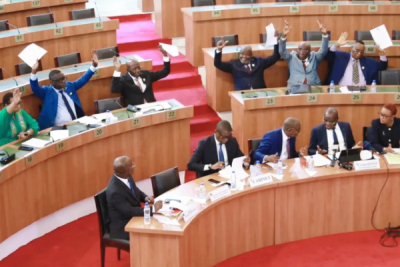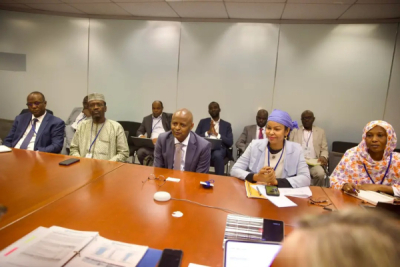Cheikh Tidiane Mbaye is Chairman of the International Jury of the Orange Social Venture Prize in Africa and the Middle East (POESAM). For several years, he has reviewed thousands of high-potential projects. He was interviewed by We Are Tech about the impact of Orange's innovation support ecosystem and his perception of the African digital economy.
We recently attended the 13th edition of POESAM. Looking at the projects you've judged over the years, what's your assessment of the level of tech innovation in Africa?
This is indeed the 13th edition. I've been on the jury for about ten years now, and I've been chairing it for about six if I'm not mistaken. And so, when you look at the number of entries, the interest generated by the prize, the evolution of the media impact, you realize that we're growing fast. To give you a figure, the number of candidates for this year's edition (2023) is around 1,400. And it seems to me that four, even five years ago, we were still around half that number. We've almost doubled in less than five years, and I find that very interesting. Another point to note is that the percentage of women is also increasing. At the moment, we're almost at 30% women, which is very significant. I think it's also important to understand that the projects submitted to POESAM reflect African needs in some way. I find it interesting to observe that these projects reflect not only the ability of young entrepreneurs to create, innovate and develop but also reflect African needs. For example, at the last award, the majority of projects focused on education, health, agriculture, and e-commerce, in order of growth. It's very interesting to see the evolution of innovation in these fields, and the Orange Prize rewards above all social impacts.
Personally, why did you agree to chair the international jury?
As I said, I've been a member of the jury for ten years. I was offered the presidency a few years ago, and I accepted. But what counts for me is the fact that I've been a member of the jury for so many years. I think my choice reflects a passion and a conviction. My passion is development. I'm passionate about development and what it takes to get there. My conviction is that we can do it. We can do it because we have the resources to do it. One of the keys for me is the private sector and the role it plays, particularly the role played by small and medium-sized enterprises. The government also has a role to play. Good governance will accelerate all these, despite the weaknesses. That's what I'm passionate about, and I'm ready to take part in any serious initiative that serves this passion and conviction, highlighting projects that have an impact on everyday life.
How did your love of innovation, which feeds your passion for development, come about?
I worked for Orange as a manager, in particular as Managing Director of Sonatel for 25 years. I was also involved in another field, that of telecoms infrastructure, which I believe is essential to the development of tech entrepreneurship. You need a good base, you need good infrastructure. Everything we've done over the years is based on the infrastructures we've taken several years to install. We've seen what our network innovations bring to communities. The innovative services offered by entrepreneurs are channeled through them. Those innovative services are offered by talented young Africans, particularly those who are promoted, supported, and encouraged by this extremely useful prize [POESAM]. So there's a continuity between what I've done since I started working and what I'm doing today.
What has the experience of chairing the POESAM jury brought you?
I have to say that I'm learning a lot, coming from an infrastructure background. We're talking about innovation and startups here. These young entrepreneurs we're supporting today criticize our activities. They criticize the companies I've worked for. This allows me to correct these companies. It allows me to get to the other side and see how things can be improved. I've intervened several times in several Orange countries to facilitate relations between startups and the Orange operators, which we represent. Operators are big, strong and don't always think of everything. These interactions have given me knowledge and humility too. I think digital inclusion in Africa is happening, and it's already not bad, contrary to popular belief.
What is your assessment of the impact POESAM has had over the years on technological innovation in Africa, and economic and social development in particular?
The prize helps a lot of entrepreneurs and startups. I have some pretty good examples. I have in mind the example of Mr. Johnson from Liberia, who is now developing palm oil-based products to offer renewable energy solutions. Thanks to the POESAM grant he received in 2018, he has doubled his income and created 24 additional jobs. Then there's the Tunisian company Kumulus, which has developed a machine that turns air into water. It managed to raise its first million euros, thanks to us, to increase its visibility. It works with Orange Group companies. There are other examples we can cite. These companies have a concrete impact on their customers. It's not just the POESAM prize-winners that this award has helped, it has stimulated innovation by enabling a large number of young Africans to dare [to innovate] and I think that's something very important. Orange Africa and the Middle East covers 17 countries. Every Orange company in every country has contributed to nurturing this innovation and drive.
Given all the innovations you've seen over the last 13 editions, how do you see Africa's prospects in the global digital economy?
I believe that Africa will play a decisive role in the digital economy. I met an entrepreneur who has worked in some of the world's biggest tech companies and has now returned to Africa. He gave up an attractive position in a big company to create his startup in the health sector. Like me, he too - along with several international firms, the World Bank, the IFC, and specialized organizations - believes that the future of Africa's digital economy will be formidable. I think that this entrepreneurial dynamism is well understood by those of us who have an insightful reading.



















